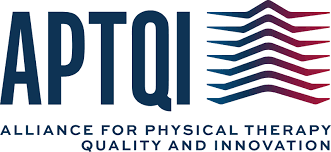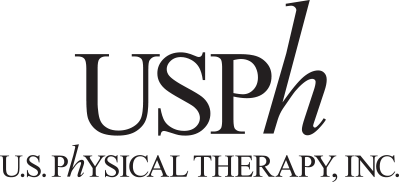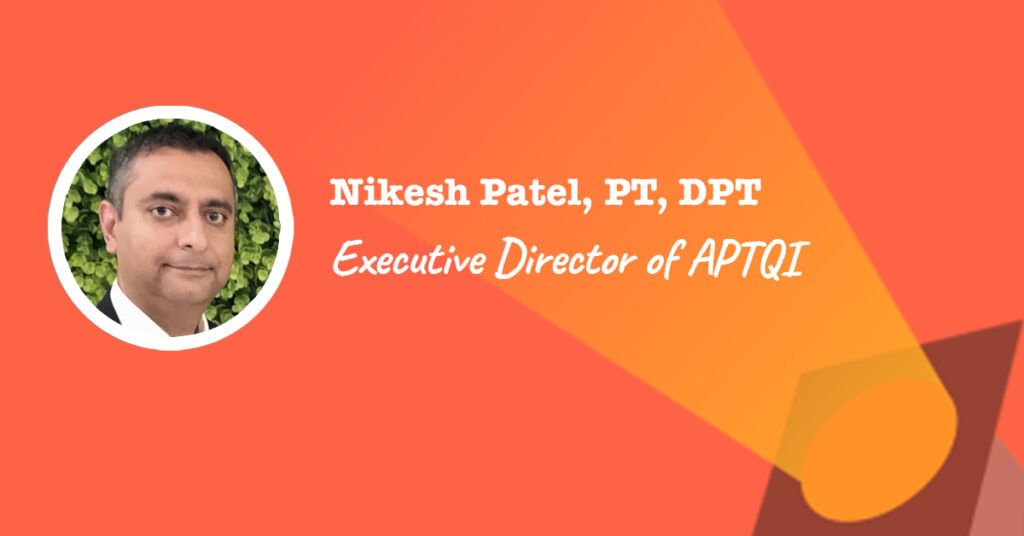This week’s non-clinical spotlight features a physical therapist who works as executive director of the Alliance for Physical Therapy Quality and Innovation (APTQI), as well as National Director of Clinical Services and Regulatory Affairs for U.S. Physical Therapy.
This post may contain affiliate links or codes. This won’t increase your cost, but it helps keep TNCPT alive, and free of annoying ads! Thank you for your support. 🙂
What is your full name and title at your current job?
Nikesh Patel, PT, DPT
Executive Director of the Alliance for Physical Therapy Quality and Innovation

National Director of Clinical Services and Regulatory Affairs for U.S. Physical Therapy

Where are you located?
Houston, Texas
Where did you go to PT school, and what year did you graduate?
I graduated from the University of Texas Health Science Center San Antonio in 2000 with a master’s degree in physical therapy and from A.T. Still University in 2005 with a doctorate in physical therapy.
What did you do when you first finished school, and for how long?
When I finished school, the Balanced Budget Act and therapy caps had just started, and jobs were very tough to come by. I had four interviews. Two were for outpatient, one was in a hospital, and one was with an EMR company to work as a consultant.
I got offers for the two outpatient jobs, and I accepted one of those. My first job was as a staff therapist treating orthopedic and sports medicine patients in a very large and busy clinic.
What did you do after that, and for how long?
I worked in a full-time clinical role for about three years before I moved into roles that were half clinical and half non-clinical. By the time I was five years out of PT school, I had pretty much transitioned out of direct patient care and into full time non-clinical roles.
Along the way to my current roles, I’ve taught CEUs, authored self-studies, and even got to teach my own class at a PT school for a couple semesters. I’ve also held roles focusing on clinical and operational support for multi-state territories at large organizations.
When did you decide to go non-clinical, and why?
I always knew I would end up on the non-clinical side eventually. I’ve had a long-standing affinity for finance and politics. When I was in PT school, I would joke with my friends that if I didn’t get a job, I would try to become a lobbyist for the AARP because retired people love physical therapists.
What are you doing these days?
I currently have multiple roles.
I serve as the Executive Director of the Alliance for Physical Therapy Quality and Innovation (APTQI), which is an alliance of outpatient therapy providers focused on advocating for laws, regulations and payer policies that reflect the value of physical therapy.
I also serve as the National Director of Clinical Services and Regulatory Affairs for U.S. Physical Therapy.
Are you still treating patients, or are you solely non-clinical?
I’m a 100% non-clinical physical therapist now.
How long have you been in your current role?
I have been the Executive Director of APTQI for two years and a National Director for USPh for five years.
How did you find your job? Did you apply or find it through a connection?
Physical therapy is quite a small world. Almost every opportunity I have had has been brought about because of a connection.
My career has largely consisted of moving up through the ranks of large organizations. In fact, I’ve rarely held the same position at a company for more than two years.
Having mentors in an organization is invaluable to moving up. More than once, I have moved into roles that were created for me by one of my mentors.
If you advanced through the company to get to where you are, what are some of the things you did to stand out, take initiative, and advance?
If you are in a large company, you will easily be overlooked if you don’t take the initiative to communicate your strengths and career goals to those around you.
Don’t be afraid to walk into your supervisor’s office to talk about your career path. Looking back, I also feel that my ability to present in front of others has helped my career. It’s no secret that most people dread public speaking. I didn’t like it initially either, but it’s something I’ve worked on since I was in elementary school. Eventually, I became pretty comfortable at it.
This has directly led me to opportunities involving teaching CEUs, teaching my own course at a PT school, and giving speeches at conferences.
If you don’t mind giving a presentation in front of other people, you automatically stand out from a crowd because most people hate public speaking.
[Editor’s Note: I, too, used to dread public speaking. Joining Toastmasters International has helped me immensely, and I cannot recommend it strongly enough to those whose fear of public speaking is holding them back.]
How have people reacted to you leaving patient care?
Most of my friends in PT school and early colleagues always knew I would leave patient care earlier than most. They were not surprised.
What’s a typical day or week in the life like for you? What types of tasks and responsibilities fill your time?
I really don’t have a typical day, and I actually like that about my career.
My day can center around a range of tasks, such as conducting clinical trainings, holding meetings, digging into financial reports to find ways to support a clinic, writing comment letters, reaching out to lawmakers and regulators, or searching for ways to grow APTQI.
What are some of the challenges of your role? What are the rewards?
My multiple roles require a lot of prioritization. On any given day, I can have multiple projects going on for different employers. I have to prioritize each task in order to be successful.
The reward for me is the impact I can create if I do something well. It’s one of the main reasons why I enjoy the non-clinical side of things.
In a clinical role, on my best day, my impact is usually limited to the dozen or so patients I saw that day. However, if I teach 30 clinicians in a CEU course, I have the chance to impact hundreds of patients.
If I create a clinical program for a company with thousands of clinicians, my impact could be tens of thousands of patients. If I help get a regulation changed or a law passed, the impact is enormous.
How do you think working as a PT prepared you for the type of work you do at APTQI? Which skills transferred?
Two things I needed a lot of in my clinical days were multi-tasking and empathy. Early in my clinical career, I saw quite a few patients per day. This allowed me to master multi-tasking early on.
Working with patients also allowed me to sharpen my empathy. Empathy is a trait comes in handy in all walks of life.
Whether you’re dealing with a patient who is hurting or a lawmaker who is considering your cause, empathy makes you better at your job.
What type of person do you think would do well working in a role like yours at APTQI?
If I had to pick one trait to make someone successful, it’s the ability to learn from mistakes.
If you’re going to branch out into new roles and pursue an unorthodox career, you are bound to make some mistakes along the way. I’m no exception. I’ve really focused on making sure I learn from those mistakes so that I make them only once.
Do you work remotely or on-site?
It depends on my schedule. On any given day, I could be in my office, working from home, or traveling and working from the road. No two days are the same.
Did you read any books, take any courses, or do anything special overall to get you where you are today?
I don’t have any specific books to recommend, however I think the reading in general is incredibly helpful, no matter the topic. There’s great knowledge and insight to be found in all types of books. I go through about 15-20 books a year.
What is next for you? What do you want to do with your career long-term?
My focus still remains on creating as big an impact as I can on the physical therapy profession. It sounds corny, but I will always gravitate towards roles that I think make the world and the profession better.
What would you recommend to someone who is considering going into a role like yours?
You should focus on skills that are helpful in all areas of life, not just clinical roles. These are skills such as communication, time management, problem solving, etc.
Seek out good mentors, and if there aren’t any around in your current job, it may be time for you to leave and find a new role somewhere else.
What would you like to change most in your profession, and why? How would you propose doing so?
Our profession has historically had problems with engagement and getting therapists involved to advocate for their profession. I feel this is changing for the better over that last few years though!
If you could teach anything to today’s graduate students in your profession, what would it be?
Being a physical therapist doesn’t mean treating patients is the only option available to you. There’s nothing wrong with branching out into other areas and having multiple roles over the course of your career.
Do you have any special advice for others who want to follow in your footsteps?
Create a great professional network.
Speaking of networking, we have a Non-Clinical 101 Alumni network that is SOLID. So many jobs are landed there!





